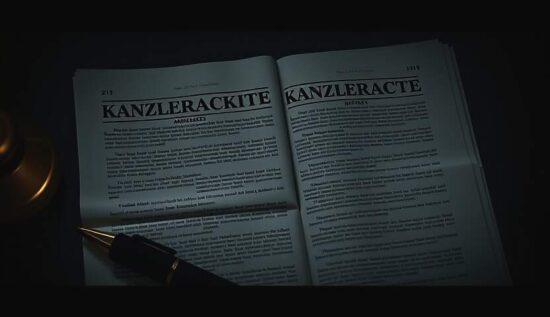Who in this turbulent era of the old continent needs a soothing balm, must only listen to the wise words of Thierry Breton, who said “we did it in Romania and we will do it if necessary in Germany too”.
What exactly? – The invalidation of free parliamentary elections within the EU in one of its members. The former EU Commissioner has burst the bubble of the alleged pretext that this invalidation was carried out solely within the powers of Romania. External interference is confirmed. Even the pathetic imperative of Breton’s “if necessary, we must” drips with a lack of self-reflection and stands in for the entire “authoritative” EU establishment and its ideological blinding and hubris.
The attentive Thierry has also already received partisan wind from German Federal President and BRD High Priest Frank-Walter Steinmeier, who will tear up his clothes and the ballot papers if a “false election result” is in sight.
While it’s fun to take all this to task, bitter disillusionment sets in when one realizes that only a small part of the German people can enjoy this tragic comedy. The others are still intensely asking themselves: “Merz or Habeck” in February 2025? Therefore, it’s time to talk about the chancellor’s act.
A document that’s not?
A first conclusion
The complete original of a “chancellor’s act” has not been made available to the public – if it existed at all. The scientific service of the German Bundestag had to react somehow (summer 2022) and positioned itself regarding the book and the claims of the “chancellor’s act” as follows:
“In the scientific literature, there is no evidence that the ‘secret state treaty’ of May 21, 1949, mentioned by the former leader of the Military Intelligence Service (MAD), Gerd-Helmut Komossa, in his book ‘The German Card’ actually existed..”
Some forensic parameters of the only available document, which refers to a “chancellor’s act”, are mentioned.
A first conclusion
The complete original of a “chancellor’s act” has not been made available to the public – if it existed at all. Even if it did, the document would surely not be immediately hung at the Ishtar Gate of Babylon in the Pergamon Museum. Silence would be maintained instead. Copies are said to have been created.
A supposed “BND secrecy case” from 1992 claims the existence of at least four copies of this “secret state treaty” (chancellor’s act). This secondary document circulates online and is not claimed by the BND. However, there is a strong plea for the authenticity of this document and all formal arguments to be questioned, and many online analyses ignore the thesis of a “grotesque forgery” – along with all formal arguments – and assume that this document is a reliable, authentic reference from the start.
Egon Bahr as a key witness
A former influential man in the power structure of the BRD, who is in his twilight years, should not be underestimated in his desire to share his views. So, Egon Bahr, as a close associate of Chancellor Willy Brandt (SPD, 1969-1973) and a decisive Federal Minister, shaped the domestic and foreign policy of Germany at the time. Bahr fell three times: in 2009 in the Zeit, in 2011 in the conversation with the Junge Freiheit, and three years later in the Compact magazine:
“In the Zeit, I described how the newly elected Chancellor Willy Brandt was presented with ‘three letters’ to the ambassadors of the Western powers for signature upon taking office. This was to confirm the binding reservations made by the military governors in their permission letter to the Basic Law of May 12, 1949. As the holder of the inalienable rights of the victors for Germany as a whole and Berlin, they had suspended the articles of the Basic Law that they understood as a limitation of their authority. Willy Brandt was outraged.”
A second conclusion
Perhaps the chancellor’s act is simply a powerful, constructed symbol of those who want to tie the sovereignty of their beloved country to something mechanical and formal, clearly rooted in the historical development of post-war Germany, in order to somehow justify and rationalize the tragic course of their nation’s development since at least 1990?





